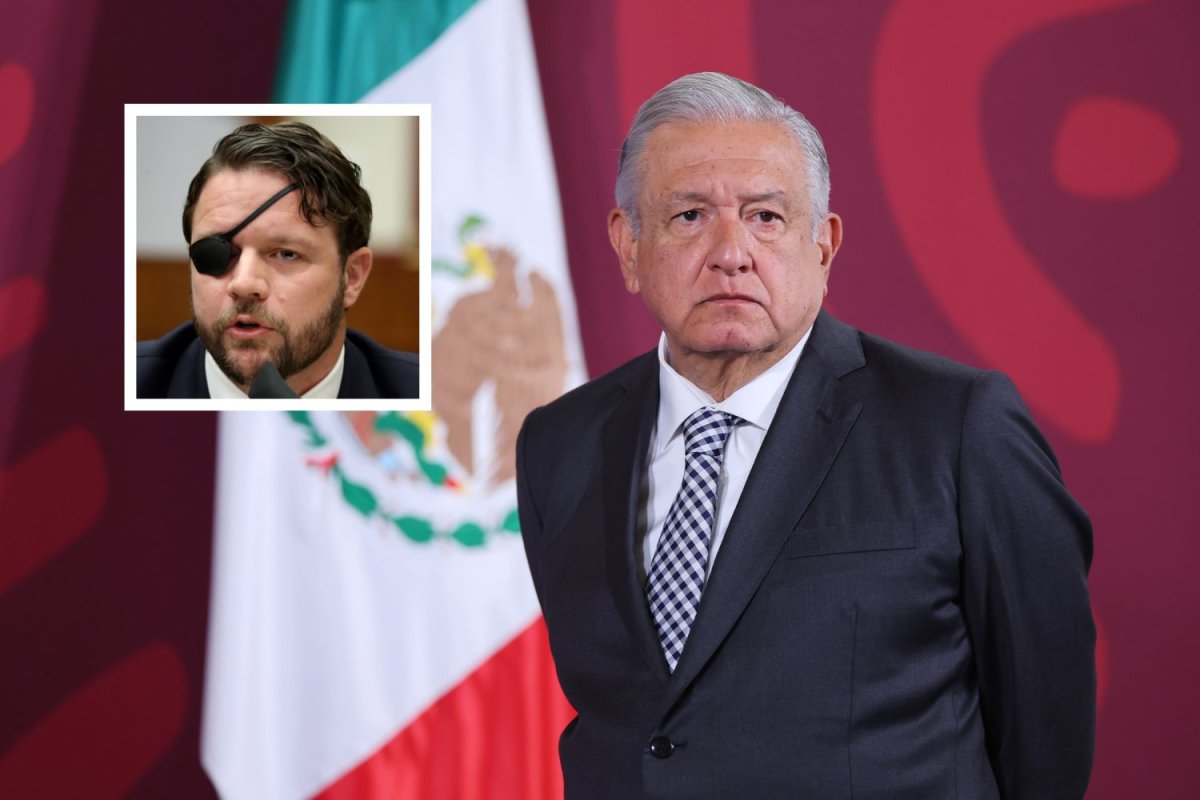- Mexican President Andrés Manuel López Obrador has warned GOP lawmakers that Mexico will not allow foreign governments to intervene in its territory after some members of the party advocated for the U.S. to take military action against Mexico's drug cartels.
- GOP Representative Dan Crenshaw, who introduced legislation allowing American forces to act, responded by asking López Obrador why he rejects U.S. aid.
- Senator Lindsey Graham has also suggested that the U.S. military should be authorized to take action against the cartels.
- Mexican Foreign Affairs Secretary Marcelo Ebrard also rejected these ideas, saying that it's "obvious" that advocating for American intervention "is an electoral strategy."
Mexican President Andrés Manuel López Obrador sent a stark warning to GOP lawmakers after some elected officials advocated for the United States to take military action against drug cartels south of the border.
"We are not going to permit any foreign government to intervene in our territory, much less that a government's armed forces intervene," López Obrador said during a Thursday news conference. He added that Mexico was its own sovereign state and "not a protectorate of the United States, nor a colony of the United States."
Earlier this week, Mexican officials confirmed that two of the four U.S. citizens who were kidnapped by members of the Gulf Cartel had been killed. Shortly after the Americans had crossed the border into the city of Matamoros, a cartel stronghold, for a medical procedure last Friday, they were shot at and kidnapped by members of the cartel. Authorities say the other two U.S. citizens have been returned home.
The incident—which happened just on the other side of Brownsville, Texas—has drawn national attention to the terror that Mexicans have faced for years. It has also prompted calls from prominent Republicans, like Senator Lindsey Graham and Representatives Dan Crenshaw and Marjorie Taylor Greene, for the U.S. to authorize military force against the cartels.

In a video shared online Wednesday, Crenshaw asked López Obrador in Spanish, "Why do you reject aid from the United States? Why do you protect the cartels?"
The Texas Republican introduced legislation back in January that would allow for the U.S. military to take action against cartels, although such a move would have to be passed by a divided Congress and be signed into law by President Joe Biden.
Since the kidnapping, Graham has suggested that he would be prepared to introduce a similar proposal in the Senate that would designate certain cartels as foreign terrorist organizations and "set the stage" for force if necessary.
"I would tell the Mexican government if you don't clean up your act, we're going to clean it up for you," the South Carolina senator told Fox News on Monday.
In response, López Obrador threatened to start a campaign against the Republican Party if their members "use Mexico for their propagandist, electoral and political purposes," saying Mexico would call on its nationals and other Hispanics living in the U.S. "to not vote for that party because they are inhuman and interventionist."
On Thursday, Crenshaw told the Mexican president on Twitter to "bring it" and advised him to campaign "against the cartels who are MURDERING your own people, not the Americans who want to help eradicate them."
Omar García-Ponce, a political science professor focused on Latin American politics at George Washington University, told Newsweek that U.S. intervention would "certianly be disastrous."
"There's growing evidence indicating that pursuing such security strategies is more likely to fail, increasing both the duration and the intensity of criminal wars (in Mexico and elsewhere)," García-Ponce said. "It'd be a big mistake and definitely a proposal faced with strong rejection from the Mexican people and government."
López Obrador had already cautioned the U.S. from intervening in matters of domestic affairs on Tuesday, saying that Americans do not see Mexico trying to "meddle" into which "U.S. criminal gangs distribute fentanyl in the United States."
On Thursday, the Mexican president suggested that the opioid epidemic is largely an American problem, saying his country does not produce or consume fentanyl, even though the Mexican government has previously admitted that fentanyl is produced in the country's labs.
"Here, we do not produce fentanyl, and we do not have consumption of fentanyl," López Obrador said. "Why don't they take care of their problem of social decay?"
Although it's true that consumption of fentanyl remains low in Mexico, the country's army just announced that it had seized more than half a million fentanyl pills in a February lab bust.
In the United States, the drug has been blamed for about 70,000 opioid deaths per year.
López Obrador's criticisms of Republicans have been echoed by Mexico's secretary of foreign affairs, Marcelo Ebrard, who tweeted that GOP officials "know that the fentanyl epidemic did not originate in Mexico, but in the United States."
On Thursday, Ebrard called Graham's suggestions to deploy military force "unacceptable and contrary to the law."
"It is obvious that this is an electoral strategy because, in addition to being impracticable, Mexico would never allow something like this," the secretary tweeted. "The consequences would be catastrophic for binational anti-drug cooperation."
Newsweek reached out to spokespeople for Graham and Crenshaw via email for comment.
Uncommon Knowledge
Newsweek is committed to challenging conventional wisdom and finding connections in the search for common ground.
Newsweek is committed to challenging conventional wisdom and finding connections in the search for common ground.
About the writer
Katherine Fung is a Newsweek reporter based in New York City. Her focus is reporting on U.S. and world politics. ... Read more
To read how Newsweek uses AI as a newsroom tool, Click here.








